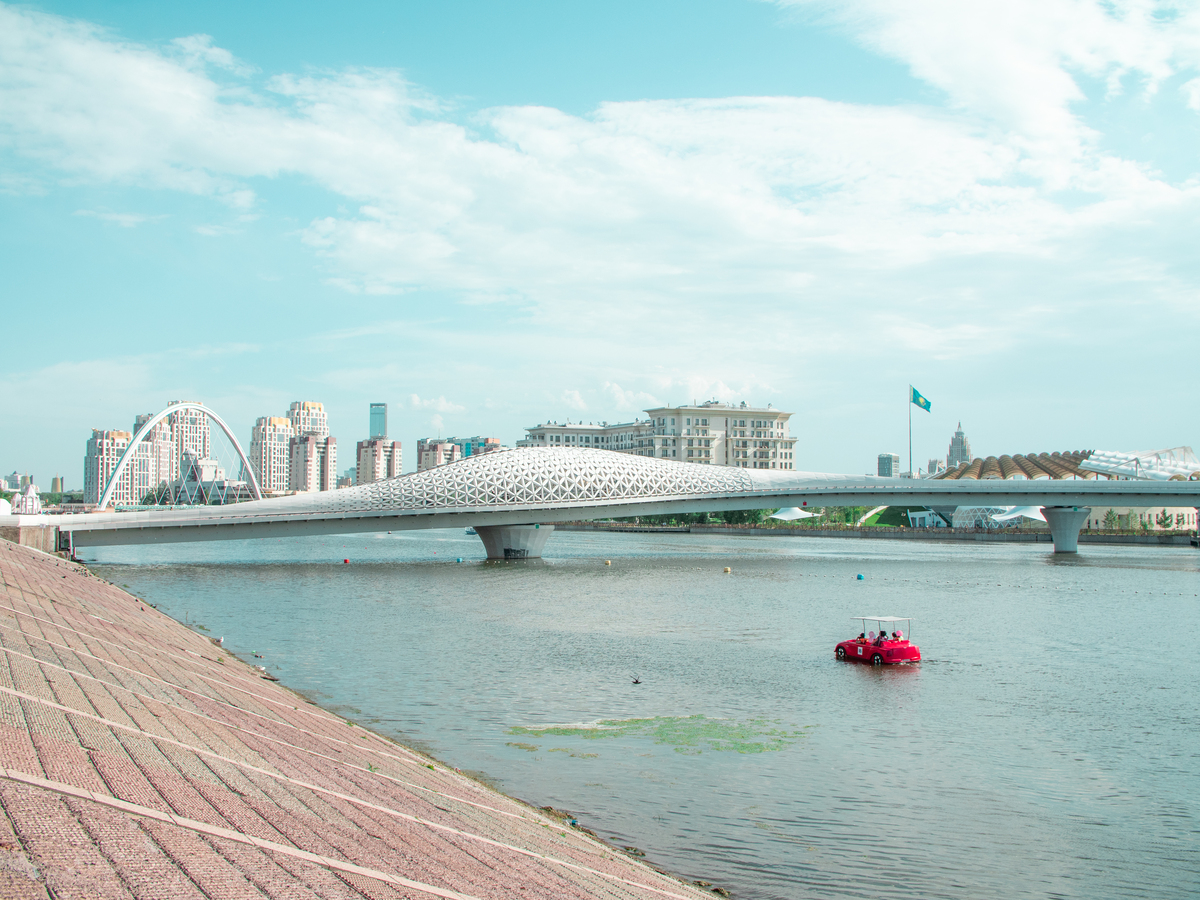ASTANA – The Astana Times has curated articles from global media outlets covering Kazakhstan. This week’s foreign media digest features topics such as the Jackson-Vanik amendment, the Middle Corridor and more.

Yessil River. Photo credit: The Astana Times
Kazakhstan working to lift Cold War-era trade restrictions
Eurasianet published an article on Oct. 22 about the Jackson-Vanik amendment, which “remains an impediment to boosting U.S.-Kazakh trade.”
“The Biden Administration and Kazakhstan are both eager to boost mutual trade and investment. But an antiquated vestige of the Cold War known as the Jackson-Vanik amendment remains an impediment to stronger US-Kazakh economic ties,” the article notes.
According to the article, Kazakhstan is a keen supporter of a U.S. initiative launched earlier this year known as the B5+1 process, under which Central Asian states strive to lower trade barriers to attract higher levels of Western investment. At the same time, Kazakh officials complain that the ability to trade with the United States is clouded by Kazakhstan’s Jackson-Vanik status.
“The amendment was adopted in a bygone era to address bygone geopolitical issues, designed to give the United States leverage in its dealings with the formerly communist countries of Central Europe and Eurasia by conditioning trade relations on a willingness to permit the freedom of movement and emigration. In passing the measure in 1974, congress gave the president the authority to waive Jackson-Vanik restrictions for any given country on a yearly basis. Removing a country permanently from the Jackson-Vanik list requires an act of Congress,” the article reads.
Middle Corridor poised to become eco-friendly transport route
The Middle Corridor has significant potential to evolve into an environmentally friendly transport route with zero emissions, Heiko Schwarz, Deputy Head of the Business Mission at the German Embassy in Baku, said at an information event titled Innovations in Railroad Technology in Azerbaijan: Partnerships and Opportunities for German Companies, which took place in Baku, reported Trend on Oct. 22.
The official highlighted that in the lead-up to COP29, the topic of environmental sustainability is becoming increasingly important. Azerbaijan, in addition to its role as an energy producer, is actively working to transform the Middle Corridor into a green route that ensures zero emissions, making it unique among global transport lines.
The Middle Corridor links the container rail freight transportation networks of China and European Union countries via Central Asia, the Caucasus, Türkiye and Eastern Europe.
Multilateral multimodal transportation infrastructure connects ferry terminals of the Caspian and Black Seas with railway systems of China, Kazakhstan, Azerbaijan, Georgia, Türkiye, Ukraine and Poland.
Kazakhstan introduces subsidies to support grain transportation and boost exports
The government of Kazakhstan has introduced subsidies to support grain transportation and other exports. Prime Minister Olzhas Bektenov instructed the government to develop a logistics support mechanism. This was reported by Railway Supply, a railway transport news portal, on Oct. 22.
According to the article, a significant portion of Kazakhstan’s grain transportation occurs by rail to Central Asia. Between 40% and 45% of grain exports rely on this mode of transport, highlighting its importance.
Islamic Emirate officials explore trade opportunities at Kazakhstan’s key inland port
A high-ranking delegation from the Islamic Emirate of Afghanistan, led by Alhaj Nooruddin Azizi, Acting Minister of Industry and Commerce, visited Kazakhstan’s largest dry port, marking a significant step in strengthening bilateral trade relations between the two countries, as reported by Bakhtar News Agency on Oct. 20.
According to the ministry’s press service, on the second day of their official visit to Almaty, the Islamic Emirate’s delegation, which included government officials and private sector representatives, toured the Khorgos dry port. Recognized as the world’s largest inland port, it is a vital trade hub within the region’s free trade zone.
The Khorgos dry port, strategically located at the China-Kazakhstan border, plays a key role in the global Belt and Road Initiative, facilitating trade routes connecting China to Europe. This infrastructure is crucial to boosting regional connectivity and expanding trade opportunities.
Kazakhstan is India’s reliable partner in energy sector; can be key source of goods & services: envoy
The Economic Times published an interview on Oct. 23 with Kazakhstan’s Ambassador to India Nurlan Zhalgasbayev, discussing Kazakh-Indian relations.
“Kazakhstan, which has significant natural resources in the energy sector, is a reliable partner for India in meeting its needs for oil, gas and other energy resources. In turn, India, with its huge market and diverse demand, presents Kazakhstan with promising opportunities for exporting various goods and services,” he said.
Kazakhstan is ready to increase exports of 40 types of products to India, valued at $148.1 million. It is possible to increase the supply of products from industries such as metallurgy, chemicals, food, machinery and construction, according to Zhalgasbayev.
